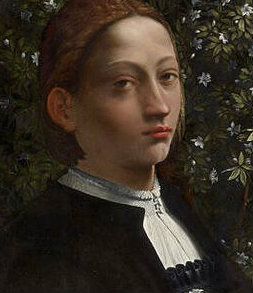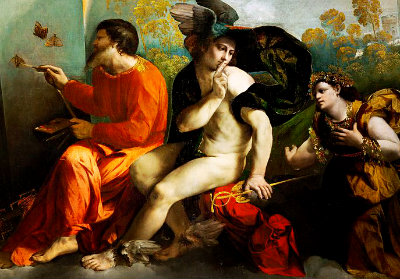The History of Art And The Curious Lives of Famous Painters
|
||||
|
About the Artist From an early age Dossi displayed exceptional original creative talent. He was gifted with the extraordinary talent not only of being a master storyteller but of innovation, with a naturalness, and almost childlike liveliness. According to Vasari "Dosso was much beloved by Duke Alfonso of Ferrara: first for his good abilities in the art of painting, and then because he was a very pleasant and amiable person--a manner of man in whom the Duke greatly delighted. Dosso had the reputation in Lombardy of executing landscapes better than any other painter engaged in that branch of the profession, whether in mural painting, in oils, or in gouache; and all the more after the German manner became known." Dosso's art is astonishing, unconventional, mysterious. His paintings exemplify the taste for mythological and religious themes that was the trademark of the nobility in Renaissance Italy. He was a genius at exploiting a painting technique known as sfumato. This technique imparted a extraordinary, almost surreal radiance for which his masterpieces are renowned. He along with his brother, Battista Dossi, were inundated with regular commissions from the Duke of Ferrara and the ruling class elites. Dossi regularly collaborated wit his brother but the tow were often at odds and had numerous fallings out over creative decisions as well as matters of the heart. Dossi's 'The Virgin Appearing to Sts John the Baptist and John the Evangelist', circa 1526, is one of the greatest masterpieces of the High Renaissance.
|
||||
|
About The High Renaissance Period Artists of the Renaissance were elevated in social standing and their art was no longer looked upon as simple handicrafts, but as divinely inspired creations. The spirit of an era awoke, revitalized with knowledge and creativity. The major painters of the Renaissance were not only artists but men of great genius who gave the world their great intellectual gifts. Florentine and Venetian painting were both formed by extraordinary personalities. These men tackled mathematical, artistic and philosophical problems of the highest interest, and presented solutions that have never lost their value. The sense of humanism pervading renaissance painting is still palpable. The painters touched on a multitude of issues regarding the human condition - death, love, reason, religion, universal morality, social problems.
Until the Middle Ages men regarded themselves as following the Good Shepherd, and art consequently did not recognize the individual in particular. In the structure and position of the figures, as in their expression, a general and uniform type of beauty prevailed. The early Renaissance marks the victory of individualism and the uncompromising prominence of he individual. According to Renaissance historian Walter Pater "Here, artists and philosophers and those whom the action of the world has elevated and made keen, do not live in isolation, but breathe a common air, and catch light and heat from each other’s thoughts. There is a spirit of general elevation and enlightenment in which all alike communicate. The unity of this spirit gives unity to all the various products of the Renaissance; and it is to this intimate alliance with the mind, this participation in the best thoughts which that age produced, that the art of Italy in the fifteenth century owes much of its grave dignity and influence.."
|
||||
|
Key Descriptive Words and Phrases associated with the Renaissance Movement - rebirth, rediscovery of the classical world, Savonarola, publication of Della Pittura, a book about the laws of mathematical perspective for artists, sfumato, chiaroscuro, spiritually significant, illuminated manuscript, idealized biblical themes, scriptorium, illuminator, plague, Age of Discovery, curiosity about the natural world, realistic use of colours and light, Old Testament stories, ethereal and foggy backgrounds, Gospel parables, romanticized landscapes, Christian symbolism. Require more facts and information about Dosso Dossi and the artists of the renaissance era? Poke around every nook and cranny of the known universe for information this subject. Search Here © HistoryofPainters.com If you like this page and wish to share it, you are welcome to link to it, with our thanks. If you feel you have worthwhile information you would like to contribute we would love to hear from you. We collect essential biographical information and artist quotes from folks all over the globe and appreciate your participation. When submitting please, if possible, site the source and provide English translation. Email to millardmulch@gmail.com |

